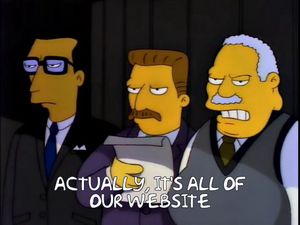It's Your Website
November 24, 2021
In my early days at Groupon, after building my first CSS framework for our internal tools, I was tasked with making a new one that would facilitate a redesign of Groupon.com. In a packed conference call with representatives with a half dozen engineering teams, I was asked by a manager three levels above me to cut some corners in order to meet an arbitrary deadline for the project.
I argued against it, saying we would incur a bunch of technical debt that we would eventually have to go back and fix, but this manager, who had come from a recently acquired competitor in Germany, was insistent. Rather than argue further, I threw up my hands and said, "it's your website."

There was stunned silence for a moment. The manager, after clutching his pearls, said, "actually, it's all of our website." To which I replied, "if you're going to ask me for my advice and then do the exact opposite, then clearly that's not the case."
This incident earned me some respect from my peers but branded me as "difficult" to management. It was a label that would follow me around for my entire 8+ years at Groupon. But the phrase “It's your website” would become a mantra that I would repeat often whenever someone would argue a little too passionately about their tools, processes or methodologies.
You can't go a day on Twitter without someone arguing why you should or shouldn't use some hot new framework. It's exhausting. Rather than get pulled into a Twitter argument (which no one ever wins), I just throw my hands up and say, “it's your website!”
As someone who works on design systems, one of my core principles is for those systems to be tech agnostic. Our tools, on both the design side (Photoshop -> Sketch -> Figma) and engineering side (Rails -> React -> Svelte), are constantly changing. So we can't let our system be tied to any single technology, otherwise when we change to a new tool, adapting our system is going to be a huge effort.
At the end of the day, the point of these tools is to make the process of building and maintaining websites at scale easier. The user is seeing HTML and CSS and doesn't care whether the site was built with ColdFusion or Angular, using Bootstrap or Tailwind, designed in Figma or on a fucking cocktail napkin. They just care about the content or buying the thing you're selling.
Can our tools improve the user experience? Sure! But that's often not why we choose them.
Whatever tools you choose, if it works for you, great! It's your website.
